“All our lives we’ve dreamed about it just to find that it was never real.”
—David Gray, “Full Steam Ahead”
The first fire escape was developed in 1784 by Englishman Daniel Maseres: a rope, attached to a window, anchored to the ground with a heavy wooden platform from which one flee from a burning ledge. In 1877, R.H. Houghton created knots tied into a rope to create a flimsy mock ladder. Then Philadelphian Anna Connelly invented the iron fire escape bridge in 1887, which connected buildings to each other, allowing those in a burning structure to safely hop over to the next.
This was effective until the Industrial Revolution, when fires became common in garment factories, theatres, schools, and docks throughout the United States. The escapes were poorly built and cheaply made, often consisting of a few wooden boards affixed to the building with a wooden ladder or stairs connecting levels. Most landlords didn’t want to diminish the aesthetics of their building’s façade, so fire escapes were situated in the back of buildings, frequently leading to a courtyard that didn’t offer solace from the smoke. Worse, some escapes were obstructed by the hands of others, a blocked off door, a silent telephone line, the utter lack of concern over blameless lives.
“Egress” refers to an entire exit system from a building: stairs, corridors, and evacuation routes. In the event of a disaster, for every occupant to properly exit, there must be enough doors and stairs. Egresses can also be backup plans in life, and many people keep them in the back of their mind: Plan B, second options, safety nets. Though what happens when those outlets suddenly don’t work, fail, break? We shouldn’t have the need to prepare for a divergence in our trails, but accidents happen on purpose.
***
I followed a U-Haul toward my mother’s house and it was liminal, that stretch of HWY 287, trailing someone else’s path to their new home, while grasping the fact that this year, I would finally get out. Time was a slow nomad, but it all crashed into its destination much quicker than anticipated. Suddenly I couldn’t quite imagine my own U-Haul traversing over two thousand miles to my next home; I could only see myself once again returning to my mother’s house three hours away from where I am now.
***
More than 180 children died in Victoria Hall in Sunderland, England, on June 1883 due to a bolted door at the bottom of a stairwell. Travelling entertainers Mr. and Mrs. Fay announced at the end of the show that children with certain numbered tickets would be presented with a prize upon exit. Many of the 1100 children in the gallery stampeded toward the staircase. The door opened inward and left a gap only wide enough for one child to pass at a time, to ensure organized ticket checking. Children surged forward and continued to crush those waiting for their reward, which only resulted in an extraction of lives.
Though Thomas Edison had invented the first practical sound recording and reproduction device—the mechanical phonograph cylinder—just six years before this disaster, one can only imagine the cries of those suffocating, calling out for parents, for a reprieve, for help, with no one realizing what was happening until their tiny bodies compressed beneath feet.
***
Karōshi, translated as “overwork death” in Japanese, is occupational sudden mortality. Japanese employees overexert themselves more than sixty hours a week, nearly fifty percent longer than a typical American worker’s full-time schedule. When the worker keeled over, it was usually due to starvation, a heart attack, or a stroke. In 1969, the first reported case of karōshi was of a 29-year-old male worker in the shipping department of Japan’s largest newspaper company, who died from a stroke. Why must a man work so much that he reached his exit sooner than he expected? Was he not happy with his earnings, always needing more before reaching the door? Was he too afraid that the moment he felt bored, he would no longer feel the need to be something?
After retirement, people often have trouble finding things to do to fill up what would’ve been an eight-hour workday. Hobbies can only stretch so far, and then with each goal achieved, we move on to the next one, and the next one, and the next one. So we build up dream houses on the coast, plan overseas vacations, put away money for a rainy day.
But the rainy days are here. And when we’ve finished each rainy day, we wait for the next one, continue to plan, keep going until there is nothing left to do. Will we ever get out of this monotony? Will we ever feel satisfied to finally reach the end?
Or is our race to the exit rushed, forced; an urgency to reach home before dark?
***
During small moments of insane tedium, after hours of watching Netflix, I’d lie in bed and stare at my ceiling, wondering what my life would be like if I was actually in the place I needed to be in. The Unrealistic Side suggests the halcyon is lined with evergreens and ferries streaming through Puget Sound; the Realistic Side proposes I’m working an unstable job somewhere I don’t necessarily enjoy, like Safeway or Costco. But both sides see that I’m happy when I finally get home, drop my shit off by the front door, and collapse on the couch with a smile. That I’ve earned my place outside my emergency exit.
***

Fire escape of Asch building after the Triangle fire, New York City, 1911, via The Wallach Division Picture Collection, NYPL.
On March 25, 1911, the Triangle Shirtwaist Factory fire in Greenwich Village killed 146 garment workers. A flare sparked in a scrap bin under a cutter’s table on the eighth floor, allegedly from an engine running the sewing machines. The flames spread toward the Greene Street staircase, hindering a major exit. The interior stairways were illegally locked by the business owners to prevent theft and unsanctioned breaks, which only gave employees two options: flee by taking the elevator until the cables buckled under the heat, or clutter on the single fire escape on the tenth floor. Already broken before the fire from being poorly constructed in the first place, the iron structure of the escape gave way, dropping nearly twenty victims a hundred feet to the pavement.
Workers on the tenth floor were able to survive by taking the stairs up through a fire exit to the roof. Workers on the eighth floor were able to get out by taking the stairs down. But workers on the ninth floor were trapped. Only a few people on the ninth floor knew about the tenth floor exit, and most didn’t know to go upstairs.
Rarely do we see the unseen, secondary escapes until it is too late.
***
For the past eighteen years I had planned my escape: at first, it was pills. Then the lack of eating during the summer. Then, during a brief stint of optimism and believing there is a life beyond emotional hell, it was to move out of Texas, the state I grew up in, where I developed all my traumas that can’t seem to flood out cleanly without destroying the rest of my tributaries.
Then I doubted my escapes. I moved on from relying on an overdose in seventh grade, from slowly starving in high school, from knowing I will get out of here once I no longer have a purpose in this college town. I felt like I belonged here, if only for half a decade. But a part of me wondered if I stayed longer, lived until the seasons took my friends to other places so they could start their own lives, would I be okay with extending the deadline of getting out, already way behind than when I had originally planned to move. I got too comfortable with this routine of boring, slow weeks, with knowing that everyone knew me, with falling in love again and again while driving on my favorite streets, recalling good memories. Somehow I had healed myself in the one place I never knew restoration could happen.
I saw the ghost of myself waiting to spill back onto North Street from the Starbucks drive-thru, walking over to Jack in the Box with a friend, turning into Canes with a boyfriend I never thought I’d have. These people, the ones who told me that it was okay to change your mind, sunk their claws in my arms, leashing me back to comfort each time I tried to break out of the backyard. I can already see this night ten years later, where my present self now is the future self then, remembering this moment.
What if this meant I was happy?
***
July 22, 1975: Anna Connelly’s invention resulted in the death of nineteen-year-old Diana Bryant and injured goddaughter Tiare Jones after a fire escape collapsed from a burning apartment building in Boston. Bryant suffered multiple head and body injuries and died hours later; the goddaughter endured the fall as she had landed on Bryant’s body, softening the impact. Bones cracked on the pavement like lightning spreading through concrete.
Stanley Forman, American photojournalist for Boston Herald American, won the Pulitzer Prize for Spot News Photography in 1976 for his photograph of the girls falling. Forman stated, “It dawned on me what was happening and I didn’t want to see them hit the ground. I can still remember turning around and shaking.”

“9/11 Attack After-Effects, ruined Twin Towers emergency exit doorway.” Photographed by divemasterking200, Flickr.
Forman’s photograph woke up America. Fire safety groups used the photo to promote safety in cities, inciting the movement to build more durable escapes, saving more lives, yet not everything can be saved all at once. Even in contemporary society, we still don’t have the proper exits. In the 9/11 attacks on the World Trade Center, some of the emergency exits inside the building were inaccessible, while others were locked. In the Stardust Disaster and the 2006 Moscow hospital fire, the emergency exits were locked and most windows barred shut. In the case of Rhode Island’s Station Nightclub in 2003, the premises was over capacity the night pyrotechnics ignited polyurethane foam used as sound insulation, which burnt all possible egresses and forced over 450 people to rush toward the front exit. 100 people died of smoke inhalation and toxic heat; 230 sustained injuries. The same happened six years later at the Lame Horse Nightclub in Russia, where pyrotechnics kindled the low ceiling and caused the deaths of over 150 people, all trampling toward the only exit they knew—the way they came in.
All the signs were there, all the arrows pointing to their way out were directed to the right places, but still no one knew how to evade a danger others swore they’d be protected from.
***
Here’s my map that I drew up in eighth grade: graduate high school in Texas and go to college in Seattle.
Here’s my map that I revised when I ended up at a Texas college: apply for MFA in Oregon and keep writing.
Here’s my map that I frustratingly accepted when I stayed at the same college for my masters because I didn’t know what to do next: apply again to the same school and one more and if neither say yes, I’m officially done with school.
Here’s my map now: I am waitlisted and if no one declines their spot, I’m either stuck in Texas or I’m going to finally move to Seattle, which had been the plan in the first place.
It’s terrifying that I keep altering my path with each map I’ve had to rebuild, thinking I might not actually be happy in the end. For an entire weekend I had an existential crisis while sitting at my computer, crying while browsing apartments in Seattle, realizing the reality of the future: I will leave behind every single person I’ve ever loved in my burning building. I don’t know why I still can’t decide to perish in the fire I started or save myself from the gasoline people kept throwing inside the windows. Somehow I cultivated a life here, even though I swore to myself nothing would ever matter enough to make me stay.
I’m not meant to stay here. People tell me that, and think I’ll be happier when I’m out. I believed them until I stopped believing myself.
It scares me to be happy. That once I have all I need, I have nothing left to work toward.
***
The 2000s was the fieriest decade for buildings and structures in the twenty-first century, capping at 72 widely-reported conflagrations. Beginning with two dead during the 2000 Immigration Tower fire in Hong Kong to twenty killed in the 2009 Medan Karaoke bar fire in Sumatra, over 5400 people have perished by blazes. In Gonesse, France, the Hôtelissimo Les Relais Bleus Hotel was destroyed after Air France Flight 4590 crashed into it shortly after takeoff from Charles de Gaulle International Airport in Paris. A blown tire and punctured fuel tank caused the plane to crash, where all 109 people on board were killed, along with four people in the hotel. Most of the passengers were German tourists en route to New York for a cruise. The 2003 Daegu subway fire in South Korea killed 192 people and injured 151 others after an arsonist targeted a train. Within two minutes, the ignited paint thinner spread to all six cars. As the train lacked fire extinguishers and had a poor ventilation system, many passengers died of asphyxiation while looking for exits out of the smoke-filled station. Since the incident occurred during the morning’s rush hour, the majority of the victims were young ladies who worked in the downtown district’s department stores and students going to class.
When other people’s exits serendipitously happen to be the same as their own, it might be a small comfort to know they’re not going down alone. The child’s last breath joined with another child’s, the women making a silent promise through spliced eye contact to protect each other, the men building up a gallant effort to save what they can, if no one makes it out, at least no one will be left behind.
***
Ian North of the band Native sings, “What is it I’m running from? What is it I’m trying to find?” Running toward the finish line—the exchange of educational papers—reveals an aberration of light, which had been there this whole time, even from the beginning. Completing college wasn’t the answer to getting out. I learned that the first time. This time, I have to figure out what I’m doing as soon as I break through the ribbon. There aren’t any fallbacks or other races to compete in. I finished. There’s nothing left to train for.
***
Incongruously named as the Happy Land fire, 87 people were trapped and killed in the Bronx social club on March 25, 1990, ironically on the 79th anniversary of the Triangle Shirtwaist Factory fire. Though Happy Land was closed in 1988 due to the lack of fire exits, alarms, and sprinkler systems, the building was occupied by young Hondurans celebrating Carnival. An arsonist, angered by a fight with his ex-girlfriend, canvassed fuel at the base of the staircase, the only access into the club, and ignited one dollar’s worth of gasoline. Though the fire was extinguished in five minutes after 150 firemen responded to the blaze, nineteen bodies were found downstairs and the rest were upstairs. Most died from asphyxiation or trampling. Some of those trapped had punched a hole through the wall in an attempt to escape. A desperate effort that couldn’t become a full-fledged victory.
***
This is how I knew moving out wasn’t going to work: one mazarine blue hour along Interstate 10 in Arizona instilled a deep nostomania, an abnormal desire to go back to familiar places. I was returning to school after a summer of misery in Oregon, and on the second day of driving, I desperately wanted to return to the insomnia, the park I strolled through in paranoia that no one was really watching me, the mundane routines of not having to depend on anyone. Going back to school meant going back to dealing with my life, which ultimately meant I had to resume running toward the exit, and I got too comfortable seeing it from a safe distance.
Every time I visited the Pacific Northwest, everything was taken care of by someone else: my father paid for our expenses; my mother convinced my uncle to let us stay with him for a few days; my little brother kept his apartment open for me while I lived in Eugene for two months. There was this nagging part of me that recognized the happiness I got here was because someone else had handled it, not because of my own hard work. So it made me afraid to leave Texas on my own, since now I had to do everything myself with almost no help, and that was enough to keep me anchored from going to the exit where I knew what it led to.
***
Maybe I wanted my pain to be so inbent that no one else could possibly stitch up my wounds with their shaking hands, knowing one wrong suture could vivisect my entire being. Maybe I wanted to keep everyone on edge around me because I was constantly at the edge of jumping off the cliché cliff and I needed/wanted someone to hold me back. I knew the ocean below would’ve killed me. But still I kept plunging forward, stopping only at the very last second on my tiptoes, peeking over the brink and thinking, wouldn’t it be nice to know the fall won’t hurt me after all.
***
All these people dying in the cat-tongue lick of flames, reaching their end by accident, colliding at junctures with faces they never should’ve seen, it’s all coincidental and yet not. You exist simply to confirm that you exist. What goes on in between all the currencies of lives and languages and liberties is excruciatingly tender and delicate, an egg freed from its shell to be dropped into swirling salted water for someone else’s benefits, for someone else to stay alive from our own mistakes. We learn from the suffocating cries to listen for help, to find better ways to obliterate the need to be prematurely saved.
I’ve arrived at my emergency exit, the one I kept in my peripheral vision for eighteen years. The crash bar is heavily fingerprinted but has never been pressed. The window shows the Pacific Ocean on the other side, the evergreens wrapped in fog, the scintillating phosphenes clearing up into golden bouquets of light. Nothing is burning behind me but everything is slowly nudging me toward the edge. All my relationships sit in their cubicles, some peering over the partition, some loitering by the water cooler, whispering, “She won’t do it. She tried to two years ago and didn’t do it. She’s not gonna do it now.”
I study this door. I’ve dreamt of this escape for nearly two decades and yet I’m still hesitating to push forward. During each breakdown about needing to be home, I always envisioned happiness in Seattle, some sort of “I told you so” to those who couldn’t believe I’d get out. If I set off the alarm too early, if what I see on the other side of the exit isn’t at all as satisfying as I thought, the whole building might go into a panic.
Or not. There are an infinite number of emergency exits here, all different routes somewhere else outside, all separate paths steering away from mine. I used to believe my exit was special and earned, that no one else in this aching history will have my exact life story, but it’s just the same as everyone else’s in a different version, with common abstracts and varying specifics. And I know that someday we will be reincarnated as someone completely new, with an entirely fresh storyline we couldn’t imagine in our preceding bodies, but it terrifies me to think I will never know myself again this intricately, this full of paradoxes so painfully mine, these tears spilled over frustrations that I could see the escape yet I kept getting held back from sprinting forward. This girl who was once agonizingly shy and quiet, who once longed for someone to return to, who once was so desperate to be happy, she won’t be repeated somewhere else, whether it is in this life or the next.
The world is mind-numbingly quiet. The streets drenched in nostalgic sepia, the kind that ushers me into a cinematic reeling under the notes of a power ballad, and I merely feel alive but detached from my existence. My brain snaps pictures of the people around me, and I realize that their life is not mine, and I am nothing more than a face that will reappear in their dreams. I am small and insignificant as I bloom out of this personal horizon. I am inert to everyone else as a lit window during dusk, as a drop of rain on windshields before the storm, as a flash semaphoring across the waves come home.
I can’t stop looking at this door and shaking my head at how blind I’ve been. There’s nothing past this. Even if I were to evacuate this building, leave behind this part of my life for something I’ve always wanted, I don’t think I’ll find my own utopia. The Pacific Northwest belongs to fifteen million people. I’d be another number. I can’t take anyone with me, and no one can keep me with them. I don’t quite belong anywhere.
***
There is a young girl sitting on a playground bench, staring at our emergency exit. Her memories are bruised by stinging teardrops, the friction between copper lights and indigo sky, the small existential crises among American highways, the brief glimpses of optimism that settled like dust in the corner to be swept later. All covered up, she trembles and tucks her knees in. How sad she is. How badly I want to comfort her, but she will stretch out eventually.
“I need you so much closer,” she says.
I sit next to her. I know she can’t hear as well as I do now, so I don’t speak. I can’t suggest that it’ll be okay, because I know it won’t be okay, and sometimes the only thing we need is silent empathy.
Her hand keeps reaching for the knob, short fingertips quite a distance away. I lean forward further than she can, but we both still can’t grasp the handle. She tries harder than I do. I sink back and watch her struggle.
Maybe the exit wasn’t the door after all.
Maybe it was getting off the damn bench.
A Note on the Invisible and Visible
“Your exit was the same as that little girl sitting on the bench—neglected without the negative emotions to it,” one of my thesis committee members noted during my defense. “You didn’t have anybody so you had the leniency of ‘If I go, I go; if I don’t, I don’t.’ The exit has come to terms with that isolation in a way that isn’t destructive for your present self.”
I had originally ended this essay terribly different, and I’m so grateful he caught a backstory that I hadn’t intended on bringing up again. In a previous piece, I had written about this little girl on the playground bench who was extremely lonely and used the exit of moving out of state as her way to get out of that isolation. Starting over often promises an entirely new life, and she was ready for it. Here, now, five months after moving from a life I finally had gotten settled in to live an unsettled life in the Pacific Northwest, I find myself regretting the breakaway. The cliché postcard image of fog concealing evergreens make me smile every morning I open at work, but when I return home, the lights brighten an empty room. I missed too much of what wasn’t permanent—I needed the people I left behind to feel happy.
The girl on the bench refused to get up, even when she could see what she wanted. She was stubborn and tortured only by herself. I’ve been thinking about selves a lot lately—that’s what my entire thesis was about. The paradoxes of changing selves, how even a chord of you can replace a fully bonded strand that was never projected to break, is terrifying. You can never be the same person ever again. The constant evolution being molded by minutes, seconds, is obstinate and a massive pressure to hang on to what you’ve always known. With this essay, I provoked the lingering thought I had during my grad school years: why one might question their escape upon arrival after running forward at full speed for many years. I was no longer the girl on the bench. I had friends, someone I really loved, and a broken heart that I willingly left them to chase an anticipated happiness. I stopped being bitter that my storyline changed so many times. That is exactly how life is supposed to go: everything invisible turns out to be visible once you realize what you should’ve been looking for.
Chris Colfer’s Struck by Lightning was published when I was seventeen, and the main character resonated an emotion all too well: “I know I’m bitter and a little jaded, but am I a sad person? Am I happy? I plan on being happy in the future for sure, but it isn’t here yet. So what does that make me, exactly?” So much time has gone by waiting for this “happy” future. I failed to realize it happened at the cusp of an era blending into a new one, that happiness falls apart in the smallest ways: when my friends and I go to the bar after a BFA reading, and even though I didn’t talk much, I still felt wholly included; when my boyfriend came over a day earlier than planned after I was out of state for three weeks because he missed me too much to wait another day. The future never ends, but it always passes right by you, a wave hello and goodbye.


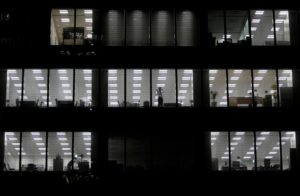

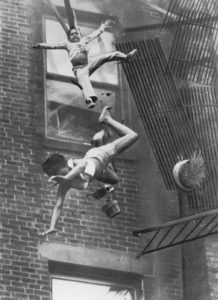
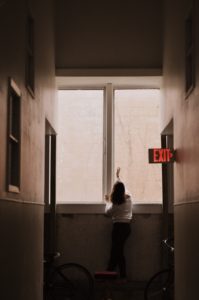
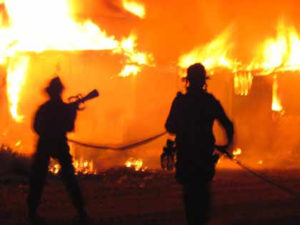




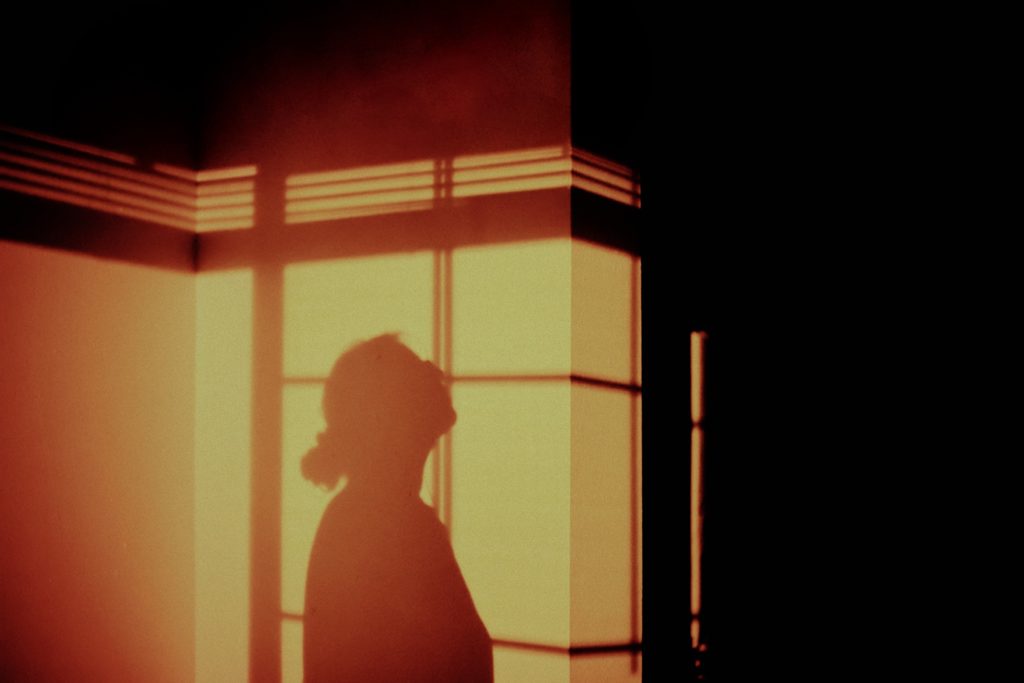
 Emily Townsend is a recent graduate from Stephen F. Austin State University. Her works have appeared in cream city review, Superstition Review, The Account, Noble / Gas Qtrly, Santa Clara Review, Slippery Elm and others. A nominee for a Pushcart Prize, Best American Essays, and Best of the Net, she is currently tinkering with essays and poems in Eugene, Oregon.
Emily Townsend is a recent graduate from Stephen F. Austin State University. Her works have appeared in cream city review, Superstition Review, The Account, Noble / Gas Qtrly, Santa Clara Review, Slippery Elm and others. A nominee for a Pushcart Prize, Best American Essays, and Best of the Net, she is currently tinkering with essays and poems in Eugene, Oregon.